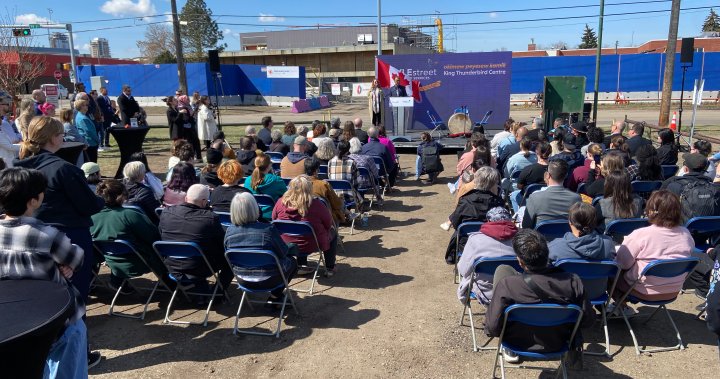Boyle Street Community Services in downtown Edmonton has secured funding for a new multi-service support centre to assist those dealing with homelessness and poverty. With a $21 million grant from the federal government, the organization has gathered a total of $45 million for the new 75,000-square-foot facility. The site, named okimaw peyesew kamik or King Thunderbird Centre in English, is set to open in late 2024, two blocks away from the original center. Boyle Street had to leave its previous location beside Rogers Place when its lease expired on Sept. 30, 2023, and has been operating temporarily at five different locations since October.
The federal government contributed $21 million through the Green and Inclusive Community Buildings program grant, with at least 10% of the funding specifically designated for projects serving First Nation, Inuit, and Métis communities, including Indigenous groups in urban areas. Boyle Street is also contributing $24 million through its capital campaign for the new centre. The facility will be energy-efficient, with enhancements expected to reduce energy consumption by 99% and reduce greenhouse gas emissions by 709 tonnes annually. The new centre will offer a variety of essential programs and services, such as health, housing, substance abuse, ID and financial services, and an outdoor space for ceremonies and land-based healing.
Jordan Reiniger, executive director of Boyle Street Community Services, expressed excitement about the project now that the funding has been secured, ensuring that the new centre will be built. Edmonton Mayor Amarjeet Sohi praised federal minister Randy Boissonnault for his advocacy and Boyle Street for their hard work in making the project a reality. The goal is to provide a centralized and reliable space that is safe for the community and will contribute to a safer and more vibrant downtown environment for residents and workers.
The new King Thunderbird Centre is being built to better accommodate the unique needs of the vulnerable population in Edmonton, providing dignified support to those who need it most in the city. The facility aims to offer a wide range of services and programs to address the diverse needs of individuals experiencing homelessness and poverty, including health services, housing support, substance abuse treatment, identification and financial services, as well as outdoor spaces for ceremonies and land-based healing. The center is a testament to the collaborative efforts of government funding, community support, and the dedication of Boyle Street in ensuring the well-being and stability of those in need.
The construction of the new multi-service support center is a significant step towards addressing the issues of homelessness and poverty in downtown Edmonton. The energy-efficient, environmentally sustainable building is expected to reduce energy consumption and greenhouse gas emissions significantly, contributing to a healthier and more sustainable community. By providing a centralized location for essential services and programs, the new facility will create a safe and reliable space for individuals in need, ultimately enhancing the downtown area and contributing to a more vibrant and inclusive community for all residents.
The boyle Street Community Services is contributing $24 million through its capital campaign. The facility will offer an essential range of programs and services, including health, housing, substance abuse, ID and financial services, and an outdoor space for ceremonies and land-based healing. The federal government also contributed $21 million through the Green and Inclusive Community Buildings program grant. At least 10 per cent of that federal funding is allocated to projects serving First Nation, Inuit and Métis communities, including Indigenous groups in urban centres. The new site, okimaw peyesew kamik or King Thunderbird Centre in English, is set to open in late 2024. It’s two blocks from the original centre, near 107A Avenue and 101 Street. The enhancements are expected to reduce the facility’s energy consumption by 99 per cent and reduce greenhouse gas emissions by 709 tonnes annually.













